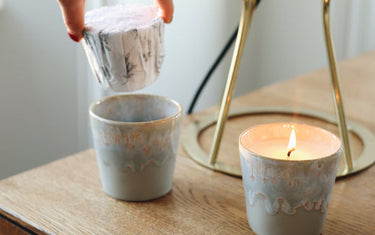5 min read / 23 February 2024 / yasmin sharp
How to Start a Perfume Business
Discover the essential steps to launching your own perfume business, from crafting a business plan to choosing the right ingredients and navigating legal requirements.
Share this post
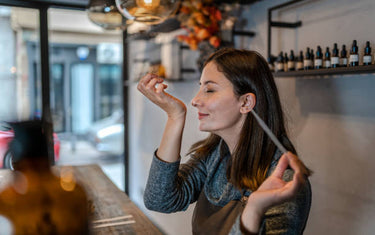
Taking the next step from gifting perfumes to friends and family to learning how to start a perfume business can seem like a lot to take on.
But it could also be the logical thing to do if your fragrances are in high demand and you are able to make good money from your perfumery expertise.
To help it make a little more sense, we’ve put together a guide on how to start a perfume business, outlining the main areas you will need to consider along the way.
How do I create a business plan for my perfume business?If you want to learn how to create your own cologne or perfume to sell, you’ll need to create a business plan framework:
|
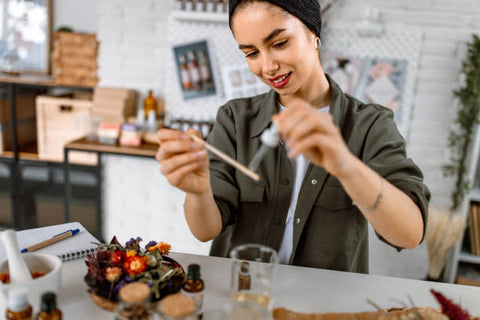
How do I research my target audience?
A fundamental part of understanding how to create your own perfume involves finding out who your prospective customers will be.
Whilst age and demographics are important, your research will have to go further to learn more about the lifestyles and emotional desires of your client base.
This will help you define your branding and set you apart from your competitors.
Part of this can come from your industry research, which can help to identify gaps in the market.
Comments left by consumers on social media can reveal some of the needs, preferences and behaviours that go into buying a perfrume, giving you a better idea of your niche and potential growth areas.
How much does it cost to start a perfume business?
To get things started, you will need to invest in certain areas of your business.
This will allow you to begin production, cover shipping costs and manage the paperwork and administration. Some startup costs to consider include:
- Perfume ingredients and equipment
- Packaging
- Shipping (Royal Mail/couriers)
- Advertising/Marketing
- Administration costs (for registering your business)
- Accounting software
Carry out research to get a better understanding of how much these elements could cost, as you can then start to budget accordingly.
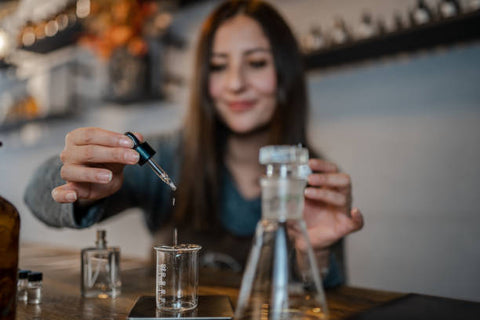
What are the legal requirements for a perfume business in the UK?
If you are using essential oils or any other hazardous substances to make your perfume, there will also be quite a few laws and regulations that need to be followed.
Perfumes are classed as a cosmetic product, and if they are being sold in the UK or EU, you will need to go through the following checklist:
- Ensure that your perfume does not contain restricted ingredients.
- Conduct a Preservative Efficacy Test if your perfume contains water.
- Calculate a ‘shelf life’ for the product and ensure that it is stable.
- If no water is being used, it must contain ingredients that prevent oxidation.
- All ingredients and batches used to make the product have been documented, along with safety data sheets and the creation of a Product Information File (PIF).
- The perfume packaging meets legal requirements, including an INCI (ingredient listing).
It’s also a good idea to look at taking out some insurance, so your business has relevant protection should any claims be made by customers.
If tackling this aspect seems daunting and confusing, you may want to seek professional legal advice to ensure you have everything covered.
How do I select ingredients for my own perfume?
At the centre of everything you do for your perfume business will be the product itself.
Perfumes consist of a blend of essential oils in base oil that have been blended with water and alcohol.
The ingredients you use will depend on the character you want to assign to your fragrance.
This means you have to decide whether it will be elegant, sporty, woody, sensual etc, which is entirely down to you and your creativity.
When it comes to choosing ingredients, remember that base notes are the deepest and last longer on skin, whilst middle notes help to balance out the top notes, which will evaporate quickly.
A fair amount of experimentation is required at this stage, as creating a perfume from scratch is a delicate process.
Keep track of the ingredients and measurements you are using, as these will be needed later for safety checks and packaging details.
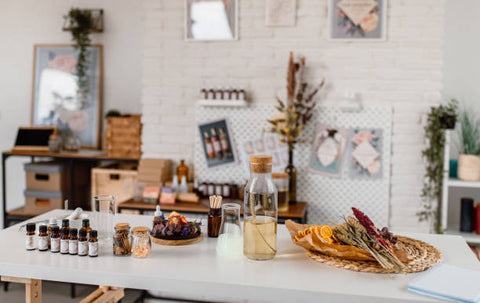
What should I consider when choosing a perfume bottle?
Presentation is everything when it comes to perfumes and fragrances, as it helps to convey the right allure, emotion and unique selling point to connect with customers.
When choosing a perfume bottle, think about the following:
- Shape: There is a huge range of bottle shapes to choose from, with oval and round designs often relating to something more feminine, whilst rectangular and square bottles are often considered to be more masculine.
- Size: Size matters because it connects to the message you want to convey, as well as the amount of product you can sell for a particular price point.
- Bottle type: Most perfumes are housed in glass bottles, although some do use plastic (you go use recycled if that is important to you). If choosing glass, coloured, frosted or clear designs are all options.
- Sprays or pumps: Selecting the right pump is also key, as how the fragrance is delivered to the customer's skin can make or break a sale. Silver and gold colours are popular, or you can go for simple black or white.
- Caps: The cap or closure should match the bottle, which will help the overall branding and messaging, whilst also helping to protect the spray/pump mechanism.

The early stages of learning how to create your own perfume business will require you to invest a lot of time researching and learning about the market and your potential customers.
But in the long run it should all pay off, as the more care and attention you give to the details, the better your business should be.
From packaging and shipping to marketing and managing the legal and financial aspects of your perfumery, there’s a lot to cover, but as long as you have a great fragrance and strong branding, it should all make scents.









